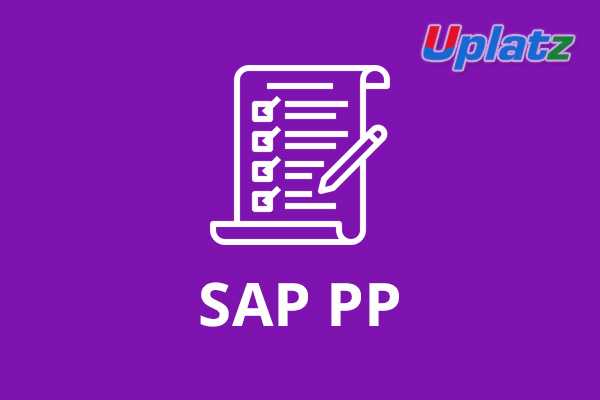Career Accelerator - Head of Operations
Master strategic operations leadership, process excellence & supply chain management in this high-impact training program.Preview Career Accelerator - Head of Operations course
Price Match Guarantee Full Lifetime Access Access on any Device Technical Support Secure Checkout Course Completion Certificate 92% Started a new career
BUY THIS COURSE (
92% Started a new career
BUY THIS COURSE (GBP 32 GBP 99 )-
 83% Got a pay increase and promotion
83% Got a pay increase and promotion
Students also bought -
-

- SAP PM (basic to advanced)
- 18 Hours
- GBP 29
- 402 Learners
-

- Career Path - IT Operations Manager
- 200 Hours
- GBP 32
- 110 Learners
-

- SAP PP (Production Planning)
- 10 Hours
- GBP 29
- 1218 Learners

Career Accelerator - Head of Operations (Self-Paced Online Course)
In an increasingly complex and fast-paced business environment, organizations rely heavily on capable operations leaders to drive efficiency, optimize resources, and ensure seamless execution across functions. The Career Accelerator – Head of Operations course by Uplatz is designed to transform aspiring and current operations professionals into strategic, performance-driven leaders. This self-paced online program delivers the essential knowledge, tools, and mindset required to excel in high-level operations management roles.
Tailored for working professionals and future-ready leaders, this course is delivered through high-quality, pre-recorded video modules that allow you to learn at your convenience—anytime, anywhere. Combining theory with application, it integrates case studies, downloadable resources, and practical frameworks to give you a hands-on understanding of modern operations leadership.
Whether you're aiming to become an Operations Manager, Director of Operations, or Head of Supply Chain, this course provides the competencies and confidence to lead organizational functions, streamline processes, and foster cross-departmental alignment. It is not just a learning program; it is a strategic career investment that positions you for senior leadership roles across industries.
Why This Course Matters
Operations is the engine room of every business. From supply chain coordination and resource planning to cross-functional execution and quality control, operational leaders play a critical role in ensuring the organization functions smoothly and profitably. However, leading operations is no longer just about managing processes—it’s about driving continuous improvement, leveraging data for decisions, navigating uncertainty, and leading diverse teams with clarity and purpose.
This course bridges that gap by offering an executive-level perspective on operations leadership. It focuses not only on foundational principles such as Lean and Six Sigma, but also on the broader strategic themes of performance management, sustainability, customer value creation, and stakeholder collaboration. You’ll be empowered to view operations as a strategic growth driver—not just a back-end function.
Who Should Take This Course?
This program is ideal for:
- Mid-level professionals seeking advancement into senior operations leadership positions
- Operations managers who want to strengthen their strategic thinking and decision-making capabilities
- Business professionals transitioning into operations from related domains such as project management, logistics, or engineering
- Entrepreneurs or startup leaders aiming to improve operational efficiency and scale their business effectively
No matter your current position, this course is structured to elevate your skills and mindset to a leadership level.
What You’ll Gain
By completing this course, you will:
- Develop a robust understanding of operations strategy and business alignment
- Learn how to design and improve processes for efficiency and consistency
- Understand the dynamics of supply chain logistics and global sourcing
- Master key operational tools and frameworks like Lean, Six Sigma, and capacity planning
- Enhance your communication and stakeholder management skills
- Build leadership capabilities for managing cross-functional teams and driving innovation
- Gain confidence in making data-driven and value-focused decisions
These skills are applicable across industries—from manufacturing and logistics to retail, technology, healthcare, and more.
How to Use This Course Effectively
To get the most out of your self-paced journey, it's important to approach the course strategically. Here’s a guide to using this course for maximum impact:
1. Define Your Leadership Goals
Start by asking yourself where you want your career in operations to go. Are you aiming for a promotion? Do you want to transition into a different industry? Use these goals to frame how you engage with the course content. Write them down and revisit them throughout the program to measure your progress.
2. Establish a Consistent Learning Routine
Although the course is flexible, it’s helpful to set a regular schedule. Treat your learning time with the same seriousness as you would a formal class. Whether it's 30 minutes a day or two hours on the weekend, maintaining a routine ensures steady progress.
3. Engage Actively with the Material
Watch the video lessons attentively, and pause where necessary to reflect or take notes. Most modules include practical examples and case studies—use these to apply concepts to your current or past job experiences. Try to relate every concept to a real-world context to reinforce your understanding.
4. Practice with Downloadable Resources
The course comes with downloadable tools, templates, and checklists. Use these materials to practice what you’ve learned or implement new approaches in your workplace. For example, apply a process mapping template to improve a workflow or try out a Six Sigma analysis on a quality issue in your organization.
5. Build a Portfolio of Insights
Create a digital or physical folder where you collect your notes, reflections, templates, and applications. Over time, this becomes a valuable resource that showcases your learning journey and can even serve as a talking point in performance reviews or job interviews.
6. Implement in Your Workplace
Wherever possible, bring course learnings into your work. Suggest improvements, lead small initiatives, or support your team with tools from the program. Demonstrating this applied knowledge not only deepens your understanding but also shows your leadership potential in action.
7. Revisit and Review
One of the biggest advantages of a self-paced course is lifetime access. Don’t hesitate to return to specific modules when you face new challenges in your job. Reviewing key lessons before leading a project or presenting to senior management helps reinforce your competence and confidence.
Propel Your Career Forward
The Career Accelerator – Head of Operations course is more than an academic learning experience—it’s a strategic enabler for your leadership career. It equips you to lead with impact, navigate complexity, and add measurable value to any organization you join. With flexible learning, practical insights, and a clear leadership focus, this program supports your growth into the high-performing operations executive that today’s businesses demand.
Enroll today to accelerate your journey toward operational leadership—and take the next decisive step toward becoming a Head of Operations.
Course/Topic - Course access through Google Drive
-
Google Drive
-
Google Drive
By the end of this course, learners will be able to:
- Understand the role of operations leadership in organizational success.
- Design and implement efficient and scalable operations strategies.
- Apply Lean, Six Sigma, and continuous improvement methodologies to enhance processes.
- Manage resources effectively and conduct data-driven capacity planning.
- Oversee logistics, supply chain, and inventory management with end-to-end visibility.
- Foster cross-functional collaboration and lead stakeholder communication initiatives.
- Lead operations transformation initiatives with confidence and measurable impact.
- Drive performance, efficiency, and innovation within operational functions.
- Align operational activities with strategic business goals.
- Prepare for top roles in operations leadership and secure career advancement.
Career Accelerator - Head of Operations Course Syllabus:
Module 1: Introduction to Operations Management
- Role of operations in business strategy
- Operations leadership principles
Module 2: Process Design & Optimization
- Process mapping & reengineering
- Lean & Six Sigma frameworks
Module 3: Quality Control & Continuous Improvement
- Quality metrics & KPIs
- Root cause analysis and corrective action
Module 4: Resource Management & Capacity Planning
- Workforce allocation
- Capacity forecasting techniques
Module 5: Supply Chain & Logistics Management
- Inventory control systems
- End-to-end supply chain operations
Module 6: Financial Acumen for Operations Leaders
- Cost control strategies
- Operational budgeting basics
Module 7: Cross-Functional Collaboration & Communication
- Managing stakeholders
- Inter-departmental alignment
Module 8: Leading Operational Transformation
- Change management in operations
- Case studies of digital transformation
Module 9: Performance Monitoring & KPIs
- Dashboards and reporting
- Continuous performance improvement
Module 10: Capstone Project & Industry Scenarios
- Final project: Designing an operations improvement plan
- Real-world case analysis
Upon successful completion of the Career Accelerator – Head of Operations course, learners will be awarded a Course Completion Certificate from Uplatz. This certificate signifies your ability to lead and transform operational functions across industries.
In addition to validating your understanding of operations management principles and tools, the certification demonstrates your readiness to take on executive and strategic roles in operations. It is a compelling credential for your CV and is recognized by employers looking for capable, leadership-ready professionals.
Completing this course positions you for career advancement into senior and executive-level operations roles. Organizations across industries—from manufacturing and logistics to IT and healthcare—are actively seeking professionals who can optimize operations and lead teams with strategic insight.
Potential job roles include:
- Head of Operations
- Director of Operations
- Operations Manager
- Supply Chain Manager
- Business Process Manager
- Operations Consultant
- Program Manager (Operations)
- Plant Manager
Industries hiring operations leaders:
- Manufacturing
- Logistics & Transportation
- Healthcare
- IT Services
- Retail & E-commerce
- Financial Services
With this training, you’ll be able to lead transformative initiatives, improve organizational efficiency, and ensure long-term operational success.
1. What is the primary role of a Head of Operations?
To oversee daily operations, optimize processes, manage teams, and align operational goals with strategic business objectives.
2. How does Lean methodology improve operations?
Lean focuses on eliminating waste, streamlining processes, and maximizing customer value, leading to cost savings and efficiency.
3. What is Six Sigma, and how is it applied in operations?
Six Sigma is a data-driven methodology that aims to reduce defects and improve quality through structured DMAIC processes.
4. What are key KPIs for measuring operational performance?
Common KPIs include cycle time, throughput, on-time delivery rate, cost per unit, and inventory turnover.
5. How do you manage capacity planning in uncertain demand environments?
By leveraging historical data, predictive analytics, and scenario planning to align resources with projected demand.
6. What are some challenges in supply chain management?
Disruptions, supplier reliability, inventory mismanagement, logistics delays, and lack of visibility across the chain.
7. How would you foster collaboration across departments?
By establishing shared goals, regular communication, cross-functional teams, and stakeholder alignment.
8. What is the significance of quality control in operations?
It ensures consistent product/service quality, customer satisfaction, and compliance with standards.
9. Describe a successful operations transformation project you’ve led.
(Example-based response expected; look for initiative, metrics, and cross-functional leadership.)
10. How would you implement a new operational strategy in a resistant team?
Through change management principles: stakeholder engagement, clear communication, phased rollout, and feedback loops.









